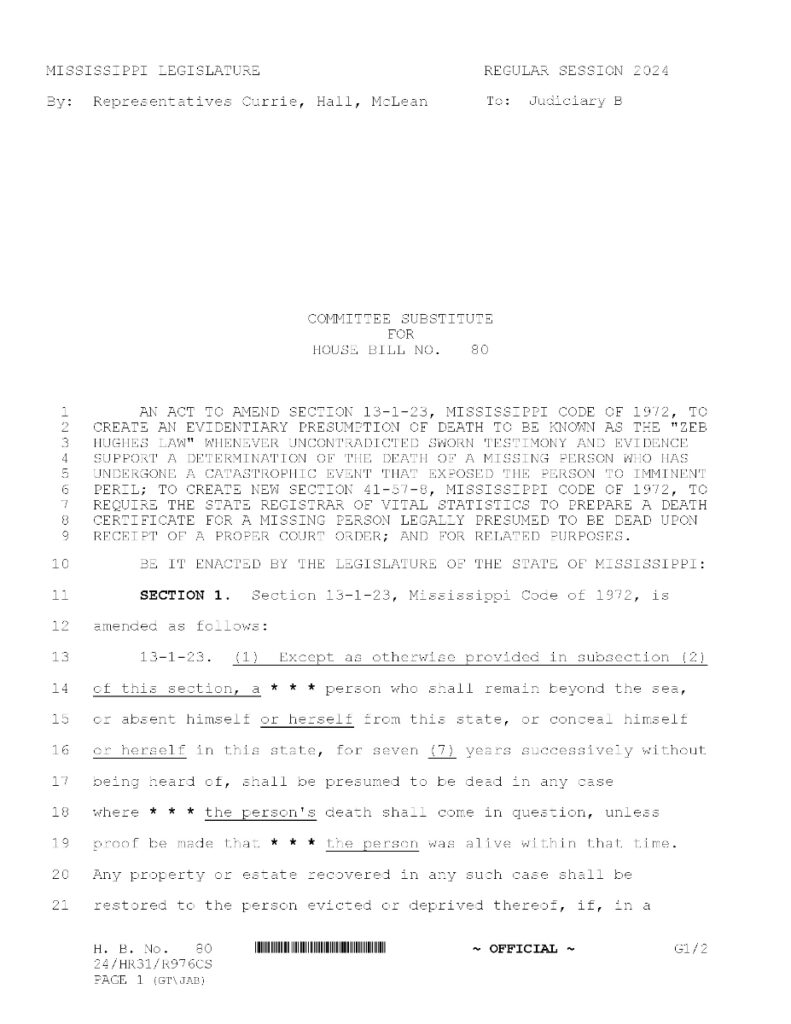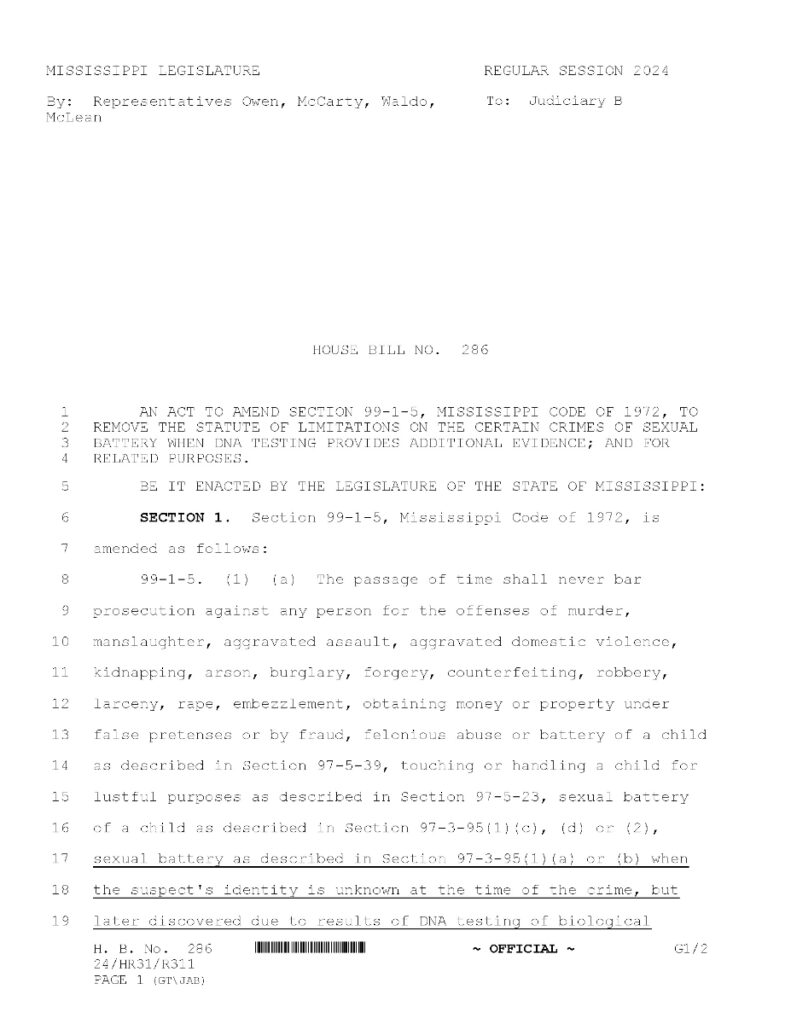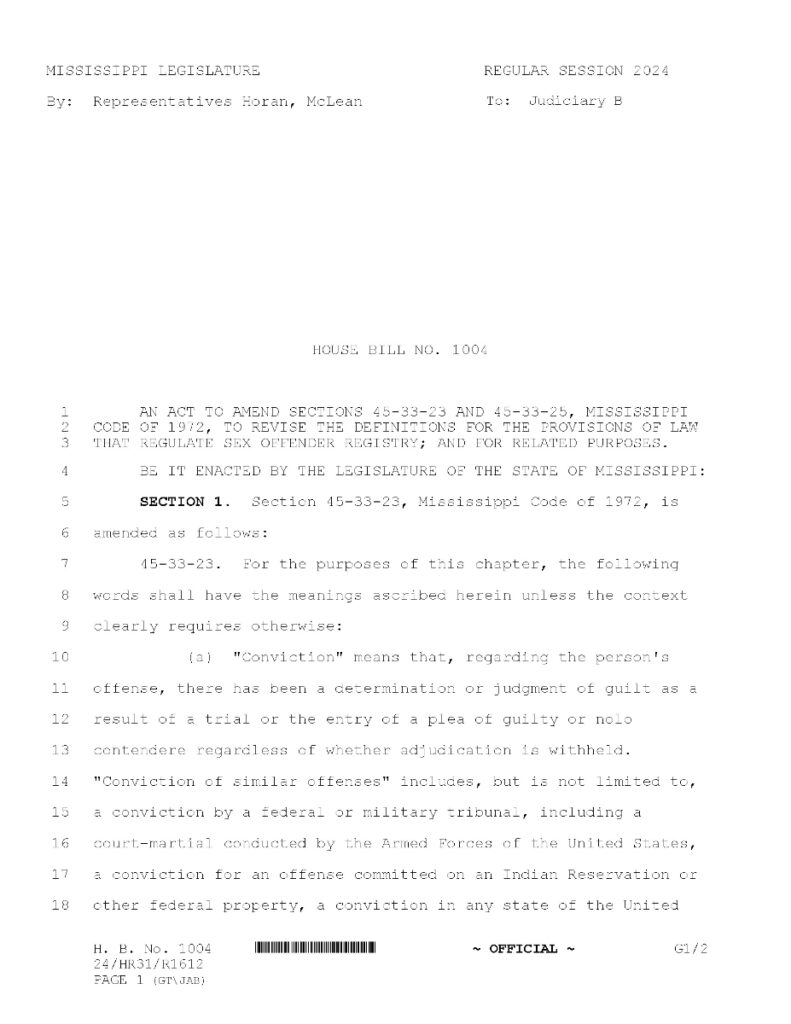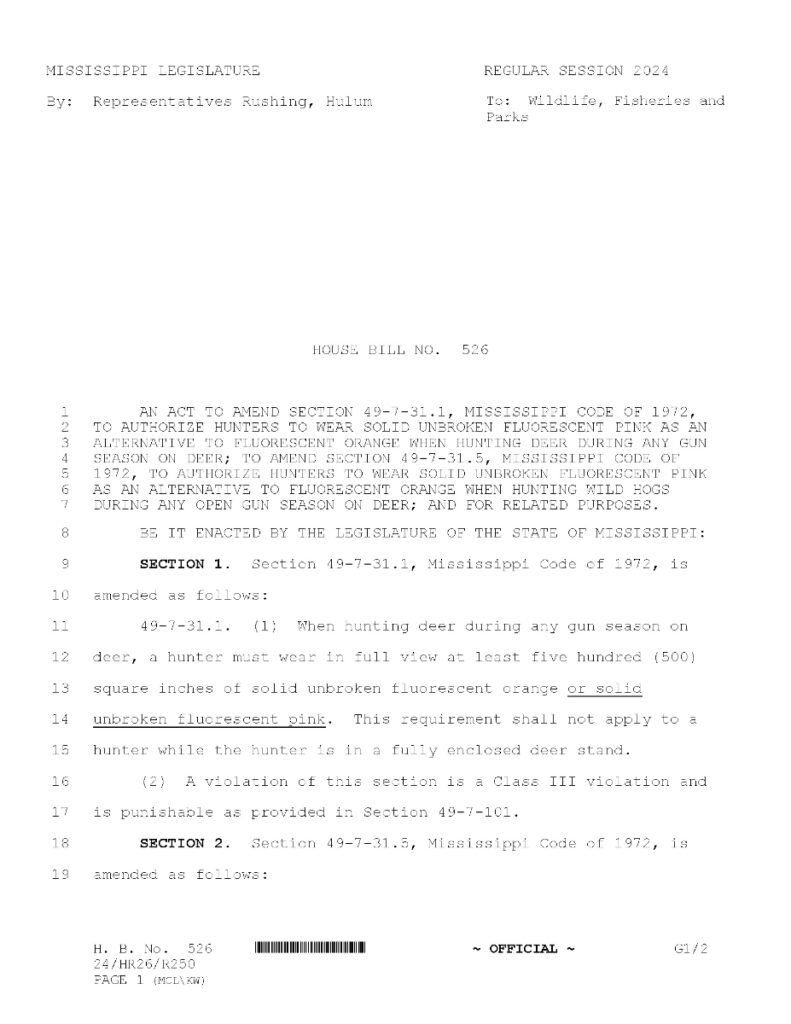Central Mississippi residents Gunner Palmer and Zeb Hughes went missing while duck hunting in a personal boat on the Mississippi River near Port Gibson, Miss., in December 2020. Up the river, searchers found the capsized boat with a hole torn in it, but never recovered the teenagers’ bodies after years of looking.
Because Palmer and Hughes’ disappearances occurred less than seven years ago, though, their families still have not been able to obtain death certificates under state law.

That could change with House Bill 80; the Mississippi Registrar of Vital Statistics could issue a death certificate after two years for a person who underwent a “catastrophic event” where there is “sworn testimony of persons with firsthand knowledge of the event” that determines the person died due to life-threatening circumstances.
“This bill is about closure. It gives Mississippi families the ability to begin healing even while hope remains,” Rep. Rodney Hall, R-Southaven, said on the House floor on Feb. 15.

Mississippi Code 13-1-23 says seven years must pass after a person has been lost at sea or missing before the State could presume the person legally dead. H.B. 80 would change the code to say no less than two years may pass before the registrar can issue a death certificate.
Hall cosponsored the bill with Reps. Becky Currie, R-Brookhaven, and Dana McLean, R-Columbus.
The House passed H.B. 80 unanimously on Feb. 15. It heads to the Senate where lawmakers will decide whether to take it up, amend it or pass it as written. If Senators pass the bill, it goes to Gov. Tate Reeves’ desk for his signature if he decides to sign it into law.
Amend Statute of Limitations Law
Prosecutors could pursue sexual-battery charges based on new evidence with no statute of limitations under a new bill the Mississippi House passed last week.
If a recent DNA test identifies a suspect in an older sexual-battery case, House Bill 286 says the State should be able to charge the suspect with a crime no matter how many years have passed.
“Currently, there is not a statute of limitations bar for prosecution of sexual battery against a child. However, there is a two-year statute of limitations for sexual-battery crimes committed against adults,” Rep. Jansen Owen, R-Poplarville, said on the House floor on Feb. 15.

Owen, who is the primary sponsor of the bill, said he drafted the legislation based on a sex-offender case he was aware of in which investigators used DNA evidence to identify a suspect in “a series of sexual-battery acts” in Hattiesburg, Miss., but could not prosecute him because the cases were beyond the statute of limitations. He did not name the suspect or any of the victims, saying only that they were “female.”
“His DNA identified him as the perpetrator of those crimes; however, the State of Mississippi could not prosecute him,” Owen said.

The bill’s cosponsors are Reps. Kent McCarty, R-Hattiesburg; Beth Waldo, R-Pontotoc; Dana McLean, R-Columbus.
The House passed H.B. 286 unanimously on Feb. 15. It moves to the Senate, where senators can amend or approve the bill if they choose to take it up. If the Senate passes H.B. 286 without changes, it goes to Gov. Tate Reeves’ desk.
The House also passed another bill last week that would change reporting requirements for people on the sex offender registry. Mississippi Code 45-33-23 defines a permanent residence as a place where a person lives for 14 or more consecutive days, while a temporary residence is a place where a person stays for seven or more consecutive days. House Bill 1004 would change the word “consecutive” to “aggregate” so convicted sex offenders have to report changes of residence whether they stay at a place every day or every few days.
“We’ve had several responsible agencies run into issues where convicted offenders say they haven’t been at that residence consecutively, so they didn’t have to report,” Rep. Zachary Grady, R-D’Iberville, said on the House floor on Feb. 15.

House Judiciary B Committee Chairman Rep. Kevin Horan, R-Grenada, and Rep. Dana McLean, R-Columbus, authored H.B. 1004.
The House approved the bill and sent it to the Senate, where Senators will amend or approve it if they decide to take it up. If H.B. 1004 passes in the Senate without amendments, it will go to Gov. Tate Reeves’ desk.
Hunters Can Wear Pink
Mississippi hunters may soon be able to wear fluorescent pink instead of orange when out in the woods. House Bill 526 requires a hunter to wear 500 square inches of fluorescent pink or orange while in the woods during hunting season. The hunter does not have to wear pink or orange while in a fully enclosed deer stand.
When Rep. John Hines, D-Greenville, asked about the significance of the color pink, Rep. Jimmy Fondren, R-Pascagoula, said it was “to encourage more people to participate in hunting” and that Mississippians had requested to wear pink while hunting.
“It’s a safe color. It’s as bright as orange and people could see it throughout the woods,” the Jackson County representative said on the House floor on Feb. 13.

H.B. 526 does not define what shade of pink hunters must wear, except by saying it should be a “solid, unbroken fluorescent pink.” Rep. Joey Hood, R-Ackerman, asked if a lack of specificity on the shade of pink could cause confusion since pink has many hues.
“I just think you got a lot of open interpretation in this bill of what is pink and what is not pink. Would you be open for any type of amendment where we could define what pink would be?” he asked Fondren on the House floor on Feb. 13.
“Fluorescent pink is just fine. I would not be open to any amendment, gentleman,” Fondren replied.
The House passed H.B. 526 by a 110-4 vote, and it goes to the Senate for approval. Senators can amend the bill or approve it without amendments. If they approve the unamended bill, it will go straight to Gov. Tate Reeves’ desk.










